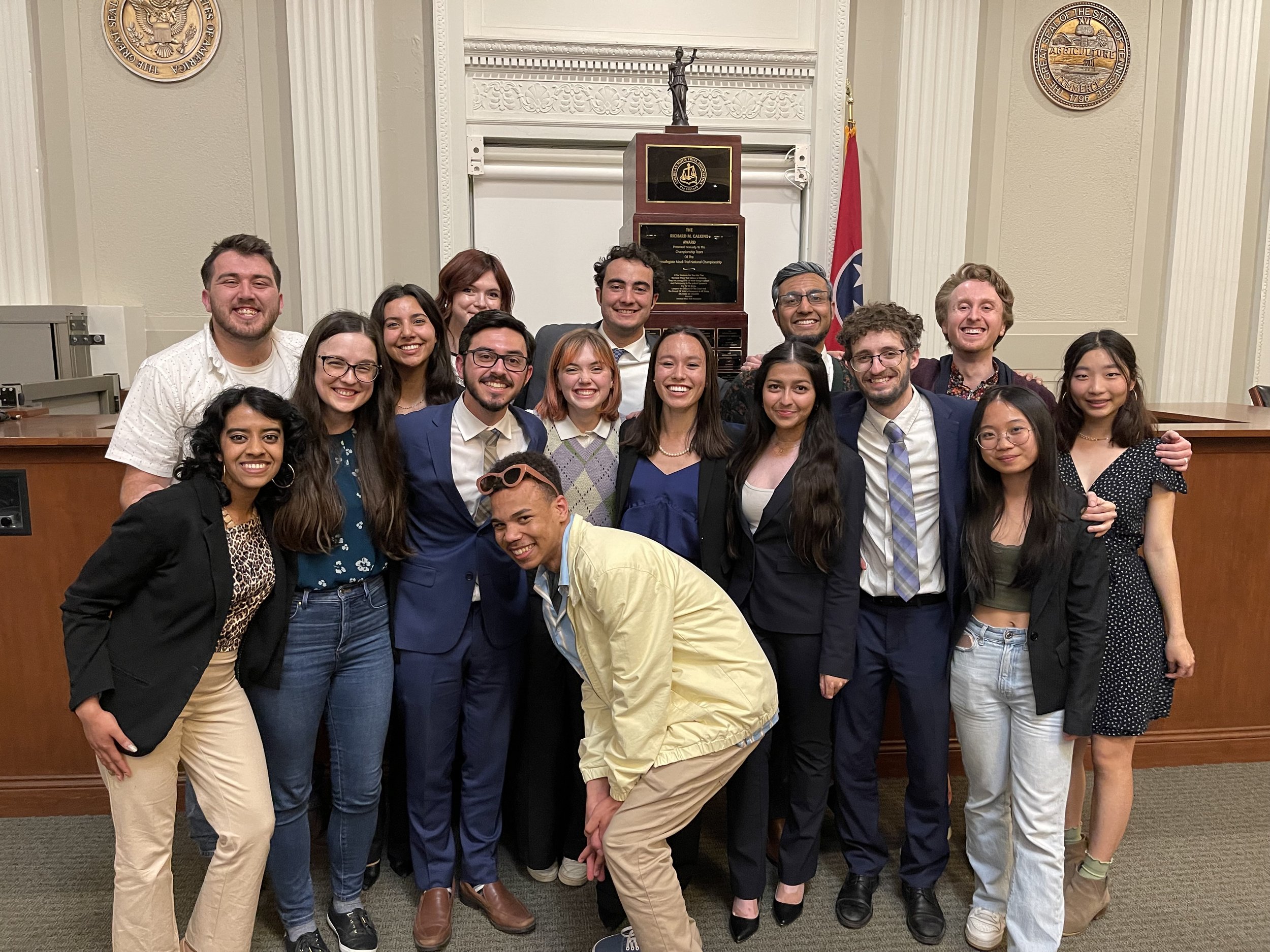Save Mock Trial
Mock trial might die.
That could sound apocalyptic. And maybe it’s an overstatement. But we need to sound the alarm.
What’s Happening
Mock trial budgets across the nation are being slashed.
This is true at the collegiate level. And in high schools.
Team after team after team after team after team after team enjoys so little institutional support that they rely on the goodwill of GoFundMe.
Many schools who love the activity are trying their best to keep the team spirit alive.
But, in a highly politicized university environment where major research initiatives are being cut (did you hear about UChicago pausing a bunch of PhD admissions?), these often student-led endeavors are put on the chopping block.
I think this is dumb. Sorry, shortsighted.
Here’s one of many badass mock trial rounds — only around an hour long.
I learned far more about LIFE in my four years of collegiate mock trial than any undergraduate class — in fact, nearly any class that I’ve ever taken (and with a BA, MA, Ed.D., MBA, and several certificates, I’ve taken a lot of classes).
This summer, I returned for the seventh time to Shanghai to help judge the Peer Potential Mock Trial Championship.
Tag yourself.
High schoolers (mainly 10th-11th graders) form teams of attorneys and witnesses, break down a 50-100 page case into key prosecution and defense case theories, and perform in at least four full trials where they make opening statements, conduct direct and cross examinations, raise objections, and advance closing arguments.
It was EXCELLENT — the very best quality I’ve seen across every year.
It was also SMALL.
Despite having four member teams (down from the usual six), only 12 teams attended instead of 20+.
There are unique concerns in the Chinese system (oversight/regulatory issues, seniors focusing more on college apps than extracurriculars, etc,).
But this raised red flags for me and inspired me to write about it.
What I’m Doing
After UCLA won its fifth national championship in 2023, I felt pretty fulfilled as a coach and decided it was time to give back to the community.
We did it!
First, I created a virtual mock trial league for 8th-12th graders alongside Max (who directs the Chinese championship). It swelled from ~10 to 40+-team competitions in the last few years.
The competition quality is excellent — we have regionally and nationally ranked volunteer undergraduate judges, a free tab system created by MIT student Carl Guo (tabeasy.org), and alumni contestants who have won the Gladiator one-on-one mock trial championship and made finals at every major high school mock trial tournament (including winning five of the top six slots at the Tournament of Champions).
How did we do it? It’s not rocket science.
We made the league 100% free; the only requirement to compete is that you provide a judge, and over 95% of teams who have applied were able to find a suitable judge (a high school graduate with mock trial or real trial experience).
We use a Slack and mailing list to keep everyone updated.
We have committees of high schoolers who divide and conquer the tough work of creating case drafts.
I don’t use any social media to promote it outside of LinkedIn and Reddit, but the students take initiative and do it themselves.
Last year, we had over 40 volunteer judges and 70 students from two-year/community/technical/vocational colleges compete — the largest such contest of its kind.
I am grateful to have the support of key AMTA executive committee members in this endeavor. I think we’ll be even bigger this year (assuming it’s approved again and we have time to advertise and reach out).
What You Can Do?
IMT is really cool. And I’d love if you got involved and judged or competed.
Flashback to a showcase round in China circa 2018.
But it’d be even better if you created tournaments of your own, especially in-person ones.
Debate teams figured this out a LONG time ago. UC Berkeley must bring in six figures every year by running a huge speech and debate tournament in February as a fundraiser.
But, shockingly, precious few undergraduate mock trial teams host their own mock trial tournaments.
You almost NEVER need more than 15 total “rooms” for the contest, including one for judges and administration.
You can reasonably charge teams over $100 per slot (since they can divide up the cost amongst the contestants) or per contestant (if you offer scholarships to help in-need students).
And, if all else fails, host it online at basically zero cost and ship out trophies after.
There is a SIGNIFICANT lack of in-person mock trial contestants for high schoolers, despite the still-existing demand.
People still LOVE this activity, budget cuts or not. They want opportunities to bring home awards to their administration and community. And your undergraduate team members can judge.
As any coach will tell you, judging is the best training for new college students, because it gives them a clear perspective on what matters and what doesn’t from a new perspective.
This is an absolute no-brainer. Do it.
You can also create new formats.
The IMT four-person team format is taken from the MockOn Tournament of Champions, which adopted it from the typical law school contest set-up. Personally, I prefer it to the six-person team version because it’s easier to get a squad together and less grueling to judge.
What if we started doing novice divisions in mock trial tournaments? Or had some more ‘top novice’ awards (as IMT has ‘top middle schooler’ awards)? That’s a norm in debate because it encourages new people to stick with a tough activity.
But other groups are also innovating.
Think about the Gauntlet, the collegiate witness tournament of champions. Witnesses are the stars and the attorney’s only job is to make their side look good and throw the other one off their game (which results in hilariously loose and daring cross-examinations).
Finally, you can get involved with existing governing bodies.
If you believe that it’s good for the American Mock Trial Association to hold contests like the CCC and Rookie Rumble (a hugely popular summer contest that only lets 1st/2nd years compete), tell them. Serve on committees. Do not take radio silence or ‘no’ as a final answer.
Fight for what you know is right — mock trial is good, and more mock trial is better. And if your leagues won’t listen, make your own.
P.S. If I didn’t mention your contribution, or your tournament, the best way to get back at me is to start your own new mock trial tournament and make it better than mine.
Nothing further at this time, your honor.



